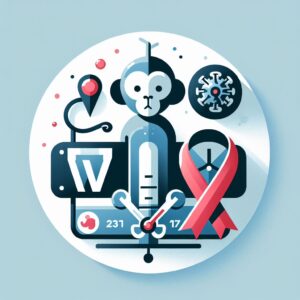WaNPRC Core Scientist Megan O’Connor just published her latest research in Frontiers in Immunology exploring what happens when there are co-infections of HIV and COVID-19 in rhesus macaques. The implications are important for future Covid treatments for people with weakened immune systems.
O’Connor, who is also an Asst. Professor in the Department of Laboratory Medicine and Pathology at the University of Washington, found that monkeys with SIV (a virus similar to HIV in humans) who were co-infected with COVID-19 had COVID longer, had a weaker immune response, and underwent changes to their gut and lung microbiomes. And that these responses were different from monkeys with COVID who were otherwise healthy.
“This work is very exciting because it shows that studying monkeys can help us ask important questions and track responses that are hard to study directly with people with COVID-19,” she said.

Her study found that the COVID-19 virus stayed in the nose and throat of SIV-infected monkeys longer than it usually does in healthy monkeys. And that the SIV-infected monkeys didn’t make as many antibodies and immune cells to fight Covid-19. Their immune systems didn’t sound the alarm properly. And the mix of bacteria in the SIV-infected monkeys’ throats and gut changed temporarily during the COVID-19 infection. What’s more, the COVID-19 virus started to evolve while inside the SIV-infected monkeys.
The monkeys experienced mild COVID symptoms and their lungs didn’t show much damage.
Many of the outcomes in SIV-COVID-19 co-infected monkeys are similar to what is seen with COVID-19 in individuals that have weakened immune systems, including people living with HIV, those with cancer, and the elderly. This research may help doctors understand why people with HIV, and other people with a, might be contagious with COVID for a longer time, not respond to vaccines as well and be at higher risk for re-infection and complications.
This might help scientists create and test new vaccines and treatments specifically for people with weakened immune systems. It might also help them understand “long COVID” since some of the same problems happen in both conditions.
Dr O’Connor and her team are currently studying whether monkeys with SIV that have already fought off COVID-19 are protected against a secondary exposure to COVID-19.